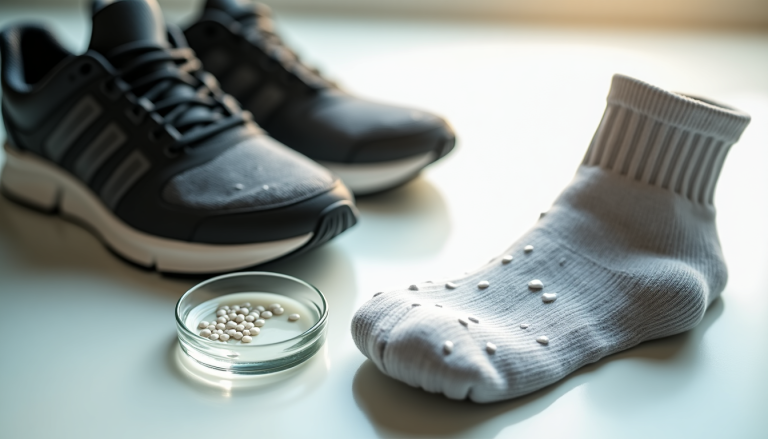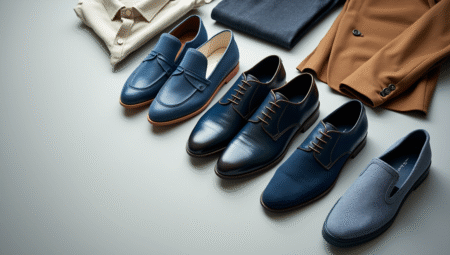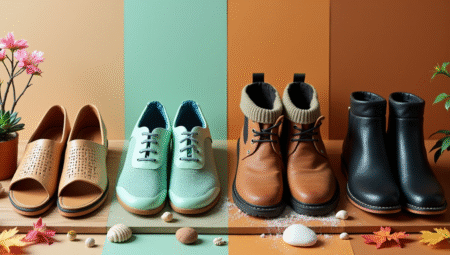The question of why shoes smell has a more complex scientific explanation than it may initially seem. Factors such as seasonal changes, daily physical activity, and hormonal fluctuations can all contribute to this unpleasant condition.
Excessive sweating and fungal infections are among the main causes of shoe odor. Poor shoe selection and low-quality materials can further exacerbate the problem. Therefore, regularly ventilating shoes and using appropriate disinfectants is essential.
In this article, we’ll examine the causes of shoe odor and effective solutions from a podiatric perspective in detail.
Why Do Shoes Smell? A Podiatric Explanation
From a podiatric point of view, shoe odor is not merely a minor annoyance but the result of a biological process. Sweat itself is odorless, but when it interacts with bacteria that thrive inside shoes, it produces unpleasant odors.
Bacterial and Fungal Growth
The primary culprits behind smelly shoes are Staphylococcus bacteria, which naturally live on the skin. These bacteria rapidly multiply in the dark, moist environment inside shoes and produce isovaleric and butyric acids. The latter has a cheesy odor and is the main source of foot odor.
Conditions that promote bacterial growth include:
- A dark and moist shoe environment
- Wearing the same socks for long periods
- Using the same pair of shoes daily
- Lack of proper ventilation
Fungal infections also significantly worsen shoe odor. In particular, sweaty feet provide an ideal breeding ground for fungi, creating a musty smell.
The Role of Sweat Glands
The feet contain more sweat glands than any other part of the body—around 600 glands per square centimeter. These glands help regulate body temperature, but inside shoes, the sweat can’t evaporate.
There are two types of sweat glands: eccrine and apocrine. Eccrine glands are found all over the body and release sweat directly onto the skin’s surface to cool it down. Sweating in the feet is mainly caused by eccrine glands located on the toes and soles.
Anatomy of the Foot and Odor
The complex structure of the foot—especially the ankle joints that bear most of the body’s weight—contains many creases and pockets where sweat can accumulate.
Moisture and heat especially collect between the toes. Movement in the ankle joints and pressure from daily activities increase sweat production. In closed shoes, the lack of air circulation accelerates the formation of odor.
Daily physical activity increases sweat and bacterial buildup, particularly in people who stand for long periods. This not only causes physical discomfort but can also damage self-esteem and affect social interactions.
Types of Odor and Their Causes
Understanding the different types of shoe odor and their sources helps pinpoint the root of the problem. Not all shoe odors are the same—some are sharp, others sour or musty. These differences are the result of distinct biological processes.
Sour Smell: Excessive Sweating
A sour smell is usually caused by excessive sweating. The feet, with their many sweat glands, are especially prone to this.
Excessive sweating—known as hyperhidrosis—can significantly intensify foot odor. Isovaleric acid, which forms on sweaty feet, produces a cheese-like smell. Certain antidepressants can also trigger localized sweating and odor.
Other causes of excessive sweating include:
- Stress and anxiety
- Hormonal changes during puberty or pregnancy
- Metabolic disorders like obesity or hyperthyroidism
Sharp Odor: Bacterial Infections
A strong, piercing odor often points to bacterial infections. Bacteria break down sweat and release volatile, smelly compounds. In shoes that are worn constantly, bacterial growth increases rapidly.
These odors can become trapped in the shoes and persist. Foot wounds can also foster infections and exacerbate the smell.
Musty Smell: Fungal Infections
A musty or moldy odor often indicates a fungal infection. These typically develop between the toes or on the soles and cause itching, redness, and a strong odor.
Moist shoes are a prime environment for Tinea pedis (athlete’s foot). This condition is contagious and can spread via shared towels or slippers.
Health Conditions Behind Shoe Odor
Shoe odor can also be a sign of underlying health problems. Sometimes, the body gives early warnings through bad smells.
Hyperhidrosis (Excessive Sweating)
Hyperhidrosis is excessive sweating, often inherited (in 40% of cases). It can affect not just the feet, but also the hands, armpits, and face.
It can be triggered by stress, medication, or hormonal changes. During adolescence, it may cause significant self-esteem issues.
Diabetes and Foot Odor
People with diabetes should pay close attention to foot care. Poorly managed blood sugar can lead to diabetic foot complications—ulcers, infections, and strong odors.
High blood sugar damages nerves and blood vessels, leading to poor wound healing. These wounds may secrete fluids that smell bad and stain socks.
Thyroid Disorders
Thyroid problems can also increase sweating. An overactive thyroid (hyperthyroidism) raises body temperature and sweat production, thus worsening shoe odor.
When to See a Doctor
You should consult a medical professional if:
- The odor is severe and persistent despite home treatments
- There are color changes, swelling, or wounds on the feet
- Foul-smelling fluids are staining your socks
- You experience pain or deformities in your toes
- You show signs of a fungal infection (itching, redness, scaling)
A dermatologist can help diagnose chronic odor issues. People with diabetes should consult a doctor at the first sign of changes in foot health.
What Helps Against Shoe Odor? Podiatric Solutions
Podiatrists offer scientifically backed treatments for shoe odor, supported by years of experience and sustainable results.
Medical Products
Effective solutions include:
- Antibacterial sprays
- Talcum powder to absorb moisture
- Antifungal creams for infections
- Aluminum chloride solutions for hyperhidrosis
- Botulinum toxin (Botox) injections and iontophoresis therapy
A teaspoon (1.5 g) of foot powder left in shoes overnight absorbs moisture, eliminates odor and bacteria—effective results can be seen after three days of use.
Choosing the Right Shoes
Podiatrists recommend:
- Shoes made from genuine leather or breathable materials
- Not wearing the same pair of shoes two days in a row
- Letting shoes air out for 24 hours between uses
- Buying one size larger for more toe room
This is especially important for athletes—choose breathable athletic shoes.
Professional Foot Care
Regular foot care can prevent odor before it starts. Podiatric tips include:
- Dry your feet thoroughly after washing, especially between the toes
- Wear cotton or bamboo socks instead of synthetic materials
- Change socks frequently—multiple times a day if needed
Professional podiatric treatments also help remove corns, calluses, and warts—all of which can contribute to foot odor.
Expert Advice for Healthy Feet
Shoe odor is a multifaceted problem. It can be caused by bacteria, fungi, excessive sweating, or conditions like diabetes or thyroid disorders.
Choosing appropriate shoes and maintaining foot hygiene are key. If odor persists, a visit to a podiatrist is advised. With the right knowledge and tools, this problem can be permanently solved.




